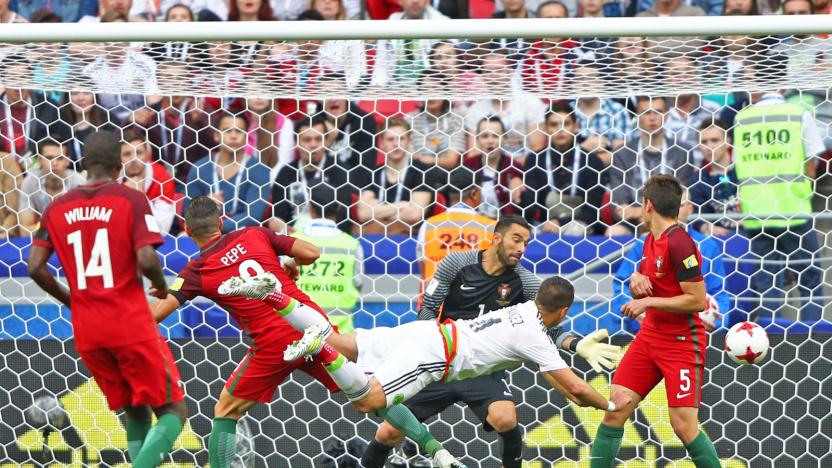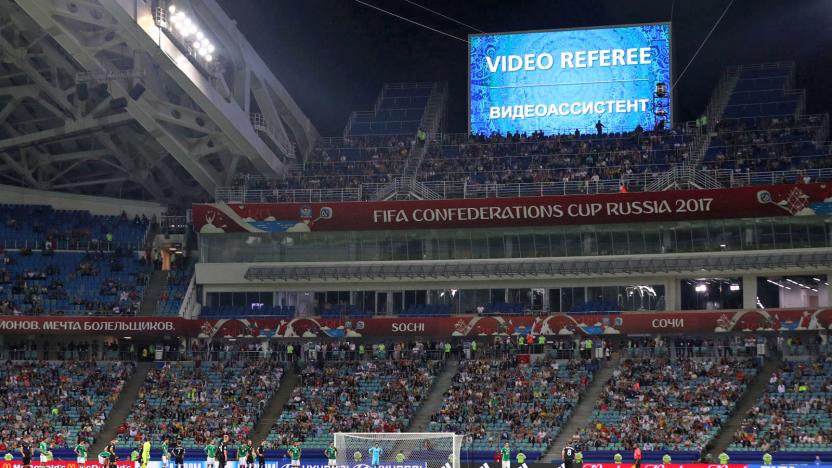ifab
Latest

FIFA rulemakers approve the use of video referees
Like it or not, video assistant referees are about to become a mainstay of the beautiful game. The International Football Association Board, which sets rules for FIFA as well as UK associations, has unanimously approved the use of VARs in soccer (aka football) matches on a permanent basis. So long as they go through a "mandatory approval process," they can implement the play review technology if they like. The decision comes after an independent university study showed that VARs had a net positive effect.

FIFA envisions a future where players wear in-game fitness trackers
Like it or not, soccer is moving into the modern era. For the past few years FIFA, the sport's governing body, has been working with the International Football Association Board (IFAB) to bring experiments like goal line technology and Video Assistant Referee to the game. But IFAB, which is responsible for creating and approving the rules of soccer, doesn't intend to stop there. In 2015, the organization announced plans to develop a global standard for Electronic Performance Tracking Systems (EPTS), with the goal being to let players use wearable tech in official matches. A decision on when and how EPTS will be implemented is set to happen next March, IFAB Secretary Lukas Brud confirmed to Engadget in an interview.

FIFA’s tech ‘experiments’ drag soccer into the modern age
Soccer is the most popular sport in the world. It may not be as big as American football, baseball or basketball in the US -- at least not yet-- but there's a much larger interest in it here now than five or 10 years ago. One of the problems with soccer is that, unlike pro sports organizations such as the NFL, NBA or MLB, it has never been quick to adopt new technology. For decades FIFA, the sport's governing body, opposed cutting-edge ideas that could keep referees from making the wrong calls. "We shall rely on human beings," former FIFA President Sepp Blatter said in 2002. "Players make mistakes, coaches make mistakes and yes, sometimes referees make mistakes. But football is passion, football is emotion. Football has a human touch."

Soccer may use video replays to help with concussions
Soccer may not be full-contact like football, but the risks of getting a concussion from a collision on the pitch are still a huge concern. At its annual meeting in March, the International Football Association Board (IFAB) will decide whether a doctor on the touchline will be able to review video replays. After doing so, medics will be able to determine if a blow to the head was severe enough to require a substitution. If approved, the system could be in place as soon as next season and ahead of the next World Cup in 2018.

FIFA will test in-game video replays next year
It took FIFA, soccer's governing body, years to bring goal-line technology into the sport. And even now that the system is approved, there are only a few leagues world taking advantage of it. Still, that decision showed the organization's willingness to evolve and keep up with other sports. Today FIFA, along with the International Football Association Board (which sets the rules for soccer), is taking another step forward by approving tests of video replays to review controversial plays during matches.

FIFA wants to have a wearable tech standard for soccer teams
The past few months haven't been kind to FIFA, football's governing body, after news broke that its top officials were being investigated for corruption crimes. But the organization isn't letting those legal woes get in the way of improving the sport's future. Next month FIFA and the International Football Association Board (IFAB), which is responsible for determining the rules of soccer football, will host meetings to develop a wearable standard for the game. In a nutshell, the idea behind this initiative is to have all professional teams using the same data-tracking technologies for training purposes. Down the line, these could make their way to live matches, to help doctors and coaches on the sidelines. Since there isn't a unified system right now, each club is allowed to work with any method they choose, so the goal is to develop a solution that works equally for everybody across the FIFA network.

Festo shows off robot penguins and other visions of the future
The folks at Festo have already proven themselves to be more than adept some intoxicating, slightly unnerving feats of robotics, but they look to have really outdone themselves with their latest group of creations, which all fall under the banner of the company's Bionic Learning Network. While they're all certainly impressive, the real star is undoubtedly the AquaPenguin which, in addition to being creepily realistic, is fully autonomous and even able to outperform its real-life counterpart in a few tasks, like swimming backwards. Of course, Festo apparently couldn't help themselves and also built a flying, blimp-like AirPenguin, and they applied some of the same basic technology to a number of other devices, including a robot arm that's precise enough to change a lightbulb, and a freestanding interactive wall that's sure to spruce up any lobby. Hit up the YouTube link below for a video that provides a brief overview of the whole lot, or head on over to Festo's site for the even better German version (plus some additional details on the projects themselves).Read - YouTube, "Festo Bionic Learning Network 2009"Read - Festo[Thanks, Gunter]



